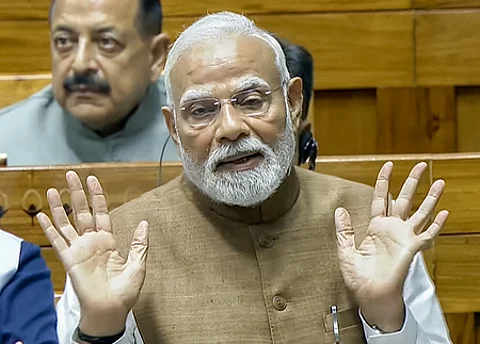

Follow TNM’s WhatsApp channel for news updates and story links.
Prime Minister Narendra Modi, in a forceful address to the Lok Sabha on Tuesday, July 29, said that during the critical hours of Operation Sindoor, not a single world leader asked India to stop its military response against Pakistan. He added that India's retaliation came from a position of strength and resolve, in sharp contrast to what he described as the opposition's appeasement politics.
"No world leader told India to halt Operation Sindoor," the Prime Minister asserted, adding that the US Vice President JD Vance had tried to contact him four to five times on the night of May 9, amid rising tensions between India and Pakistan. "I was in a national security meeting and could not take his calls. I returned the call later," Modi said.
According to the Prime Minister, Vice President Vance had warned him of an imminent Pakistani military action. "I told him clearly, if Pakistan attacks, it will pay a very heavy price. Our response will be much bigger," Modi said. He also clarified that the Indian counter-offensive, launched on the night of May 6-7, was focused, swift, and did not escalate into broader conflict.
Operation Sindoor was India's military retaliation after the terror attack in Pahalgam, Jammu and Kashmir, that claimed 26 lives. Modi noted that the operation precisely targeted terror camps in Pakistani territories such as Bahawalpur and Muridke. "The world witnessed the scale of our response, from Sindoor to Sindhu," he said, referencing India's decision to put the Indus Water Treaty under abeyance.
The Prime Minister refuted US claims, especially from former President Donald Trump, that Washington had brokered a ceasefire. He insisted the ceasefire came only after Pakistan’s own Director General of Military Operations reached out to India.
Modi also spotlighted India's air defence capability, stating that over 1,000 drones and missiles sent from Pakistan on May 9 were intercepted. “Our armed forces have earned a sterling reputation worldwide. Our defence exports now reach over 100 countries,” he said, attributing this success to 10 years of strategic planning and reforms, including the appointment of a Chief of Defence Staff (CDS).
The Prime Minister launched a sharp attack on the Congress party, accusing it of demoralizing the armed forces. "It is unfortunate that while the world supported us, our own brave soldiers did not get the support of Congress," he said. Modi alleged that the opposition party tried to use the Pahalgam attack for political gains, calling it an old habit of "finding faults in our forces."
Referring to the past, Modi criticized Congress for demanding proof of previous surgical strikes and said, “It’s good they didn’t seek credit for Operation Sindoor. Such air strikes never happened during their regime.” He also revisited the Indus Water Treaty, calling it a historic blunder by Jawaharlal Nehru. "Blood and water cannot flow together," he declared.
He also added that this is a “new India” that acts in national interest without seeking foreign approval. “We will not ask for permission to defend ourselves,” he said.
The day-long debate in Parliament saw fierce exchanges, with Congress leader Rahul Gandhi accusing the government of limiting the Armed Forces' operational freedom during the operation. Rahul alleged that the military was instructed not to target Pakistani defence infrastructure. Modi dismissed these claims, saying that the Congress was aligning itself with Pakistan’s narrative.
(With IANS inputs)